|
 Secure Site
Secure Site
|
 |
Archive for the 'Bamboo Chime Clocks' Category
 winter self massage During winter, nature sighs deeply and burrows down for a long sleep. Like the denning bears and squirrels, use these cozy times to reduce stress. Especially in urban environments, we often become detached from this seasonal message. Continuing at a frenzied pace, we develop anxiety, high blood pressure, and digestive upset. To reduce stress, “in winter we focus a lot more on massage and nutrition,” says hydrotherapist Kristi Zimmer. Try this self-massage five minutes before bed and just after waking up in the morning: Set your Zen Chime Timer for 5 minutes. Lie on your back and make gentle circular motions around your belly with both hands, going clockwise as you breathe deeply. After five minutes of this, leave your hands on your stomach as you take 20 deep breaths, sending the breath to your organs. The deep breathing calms the body and mind, while the massage aids digestion.
adapted from Natural Solutions Magazine, January 2007 by Nora Isaacs
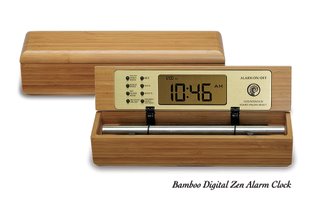 Chime Timers in Bamboo with Natural Acoustic Chimes Now & Zen’s Natural Chime Timer Store
1638 Pearl Street
Boulder, CO 80302
(800) 779-6383
Posted in Bamboo Chime Clocks, Chime Alarm Clocks, intention, Meditation Timers, Meditation Tools, mindfulness practice, Natural Awakening, Well-being, Zen Timers
 Use Mindfulness Practices to Stop Stress You’re cut off while driving. Your children erupt into a screaming fight. Or you’re five minutes away from an interview for the job of your dreams and your composure evaporates in a rush of anxiety. When life delivers adversity, stress is the common response. Your body kicks into action, preparing for a fight. The adrenal glands pump out adrenaline and noradrenaline — hormones that increase the heart rate, quicken breathing, raise blood pressure, and tense muscles. You’re ready to take on the perceived threat to your safety or well-being.
Of course, in reality we rarely run from foes or physically challenge them. As a result, we don’t burn off these powerful hormones, leaving them to “course through our bloodstream,” explains Dr. Herbert Benson, a pioneer in stress research at Harvard Medical School’s Mind/Body Medical Institute. In the short term, a pounding heart and sweaty palms can exacerbate the stressful emotions you’re already feeling. Left unchecked, this chemical mix sets you up for an array of physical and emotional problems, says Benson, including anxiety, depression, and intensified PMS and menopause symptoms.
The next time you are facing a stressful situation, stop yourself from spiraling out of control and bring yourself back to center.
Our Zen Timepiece’s acoustic 6-inch brass bowl-gong clock & timer is the world’s ultimate alarm clock, practice timer, and “mindfulness bell.”
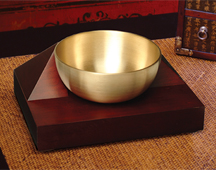 Acoustic Chime Timer and Alarm Clocks from Now & Zen - Boulder, CO
It fills your environment with beautifully complex tones whenever it strikes. In the morning, its exquisite sounds summon your consciousness into awakening with a series of subtle gongs that provide an elegant beginning to your day. Once you experience the Zen Timepiece’s progressive awakening, you’ll never want to wake up any other way. It also serves as the perfect meditation timer and ‘mindfulness practice clock’.
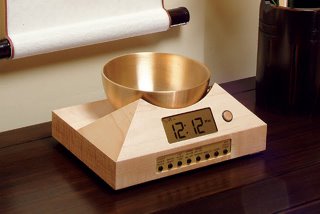 Mindfulness Practice Timer with Singing Bowl Adapted from Body + Soul, text by Erin O’Donnell
Now & Zen Meditation Timer Store
1638 Pearl Street
Boulder, CO 80302
(800) 779-6383
Posted in Bamboo Chime Clocks, Chime Alarm Clocks, intention, Japanese Inspired Zen Clocks, Meditation Tools, mindfulness practice, Now & Zen Alarm Clocks, Truth, Well-being
 Mountan Meditation Mountain Meditation
Create a comfortable, stable, supported seated posture. If sitting on the floor, support your knees with pillows or blocks. Sit upright and close your eyes. Let your breath flow naturally, without manipulating it. Rest your attention on the rising and falling of your belly or chest.
Imagine a majestically tall mountain. Contemplate how solid and stable the mountain is throughout the changing seasons. At times the mountain may be clouded over, its peak covered in fog. Sometimes the mountain is assaulted with thunder, lightning, and heavy rains. Sometimes it rises into a clear blue sky or a few white puffy clouds. At times it is covered in snow, at times with lush foliage, and at other times it is barren. Throughout, it remains stable and unaffected by the changing weather or seasons. Let this stable quality of “mountainness” nourish your concentration and your ability to sit through all the varying experiences that arise while practicing this meditation.
Now feel your posture to be like a mountain. Breathing in, see yourself as a mountain; breathing out, feel stable. Some thoughts and emotions are like storms, others like sunshine. Your mind can be clouded over or clear and bright, but through it all, you can still sit solid.
adapted from Yoga Journal, by Frank Jude Boccio
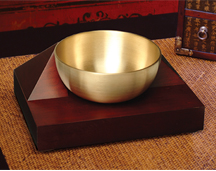 Meditation Timer with Singing Bowl Now & Zen
1638 Pearl Street
Boulder, CO 80302
(800) 779-6383
Posted in Bamboo Chime Clocks, Meditation Timers, Meditation Tools, mindfulness practice, Now & Zen Alarm Clocks, Well-being
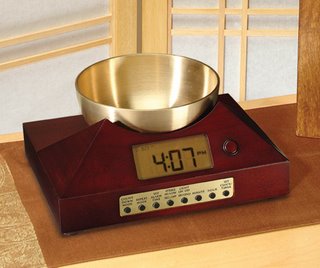 Zen Timepiece with brass bowl
Discover the healing power of sound with singing bowls, tuning forks, and other musical instruments.
Music can move us to tears, help us feel calm or comforted, or inspire us to action. The rhythmic sounds of nature (think of waves breaking on a beach) can bring us into balance. Now researchers are learning more about how music and sound directly affect the healing process.
EVIDENCE. A 2008 study at the University of Maryland School of Medicine revealed that listening to music you consider joyful for 30 minutes helps release endorphins to relieve pain and reduce stress, which can otherwise overload your immune system and lead to a host of health conditions. Another study completed last year at Seattle University in Washington showed that listening to Mozart for 12 minutes three times a week can lower systolic blood pressure by seven points.
YOUR BODY TUNES IN. Researchers say that when you listen to music and sounds, your heartbeat, breath, and brain waves begin to slow down or speed up in response to what you’re hearing. Your body syncs up with the sound, and the result can be an enhanced relaxation response—stress lifts, your heartbeat slows, muscles relax, and your body releases feel-good endorphins—or improved energy levels, depending on the rhythm.
GET STARTED. Try these ways to benefit from sound therapy:
EASE STRESS:
Use tuning forks and singing bowls
“Sonic tools” like tuning forks and singing bowls can soothe an overexcited nervous system, says Jonathan Goldman, author of The Seven Secrets of Sound Healing (Hay House, 2008). Singing bowls create a calming noise when you run a mallet around the rim, and tuning forks hum when tapped.
Try it: Use these tools as frequently as needed, says Goldman. For tuning forks, go to Healing Sounds or Biosonics. For crystal singing bowls, visit Crystal Tones. For Tibetan singing bowls, try Now & Zen, Inc., Headquarter Store, 1638 Pearl Street, Boulder, CO 80302.
RELIEVE INSOMNIA:
Listen to a healing CD
“Music is to the nervous system what nutrients are to the body,” says Joshua Leeds, author of The Power of Sound (Healing Arts Press, 2001). He designs audio CDs with music, special effects, and sounds from the natural world to enhance various activities, such as falling asleep.
Try it: See Sound Remedies or Steven Halpern Inner Peace Music.
SHARPEN YOUR MIND:
Learn an instrument
Studies show that daily practice of a musical instrument can keep the brain young and pliable. It can also help relieve tension as your body actually resonates with the soft energies of the instrument.
Try it: Find a local teacher and ask about beginner lessons. Practicing for five minutes can clear tension and a foggy mind. Use your Zen Timepiece in the morning to wake up to a singing bowl for a gentle and progressive awakening.
Our Zen Timepiece’s acoustic 6-inch brass bowl-gong clock is the world’s ultimate alarm clock, practice timer, and “mindfulness bell.”
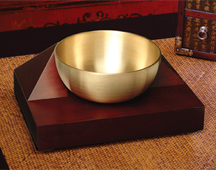 Natural Sound Alarm Clocks & Sound Therapy It fills your environment with beautifully complex tones whenever it strikes. In the morning, its exquisite sounds summon your consciousness into awakening with a series of subtle gongs that provide an elegant beginning to your day. Once you experience the Zen Timepiece’s progressive awakening, you’ll never want to wake up any other way. It also serves as the perfect meditation timer.
adapted from Natural Health Magazine July 2010, by Elizabeth Casey
 Singing Bowl Clocks by Now & Zen called The Zen Timepiece
Posted in Bamboo Chime Clocks, Chime Alarm Clocks, Goodness, Meditation Timers, Meditation Tools, mindfulness practice, Natural Awakening, Progressive Awakening, Well-being, Zen Timepiece by Now & Zen, Zen Timers
 Digital Zen Alarm Clock Meditation Timer Digital Zen Alarm Clock Meditation Timer
Meditation is generally an inwardly oriented, personal practice, which individuals do by themselves. Meditation may involve invoking or cultivating a feeling or internal state, such as compassion, or attending to a specific focal point. The term can refer to the state itself, as well as to practices or techniques employed to cultivate the state. There are dozens of specific styles of meditation practice; the word meditation may carry different meanings in different contexts. Meditation has been practiced since antiquity as a component of numerous religious traditions. A 2007 study by the U.S. government found that nearly 9.4% of U.S. adults (over 20 million) had practiced meditation within the past 12 months, up from 7.6% (more than 15 million people) in 2002.
Although meditation can be done in almost any context, practitioners usually employ a quiet, tranquil space, a meditation cushion or bench, and some kind of timing device to time the meditation session. Ideally, the more these accoutrements can be integrated the better. Thus, it is conducive to a satisfying meditation practice to have a timer or clock that is tranquil and beautiful. Using a kitchen timer or beeper watch is less than ideal. And it was with these considerations in mind that we designed our digital Zen Alarm Clock and practice timer.
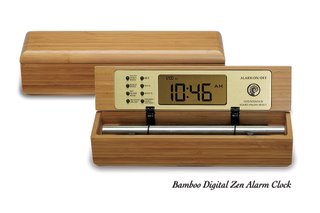 Meditation Timer
This unique “Zen Clock” features a long-resonating acoustic chime that brings the meditation session to a gradual close, preserving the environment of stillness while also acting as an effective time signal. The Digital Zen Clock can be programmed to chime at the end of the meditation session or periodically throughout the session as a kind of sonic yantra. The beauty and functionality of the Zen Clock/Timer makes it a meditation tool that can actually help you “make time” for meditation in your life.
 Now & Zen's Meditation Timer Shop - Boulder, CO
Now & Zen’s Meditation Timer Shop
1638 Pearl Street
Boulder, CO 80302
(800) 779-6383
Posted in Bamboo Chime Clocks, Zen Timepiece by Now & Zen
 meditation trains your brain Using a magnetic resonance imaging (MRI) machine, Eileen Luders, a re-searcher in the Department of Neurology at the University of California Los Angeles School of Medicine, looks for evidence that meditation changes the physical structure of the brain. Until recently, this idea would have seemed absurd. “Scientists used to believe that the brain reaches its peak in adulthood and doesn’t change—until it starts to decrease in late adulthood,” Luders says. “Today we know that everything we do, and every experience we have, actually changes the brain.” Indeed, Luders finds several differences between the brains of meditators and nonmeditators. In a study published in the journal NeuroImage in 2009, Luders and her colleagues compared the brains of 22 meditators and 22 age-matched nonmeditators and found that the meditators (who practiced a wide range of traditions and had between 5 and 46 years of meditation experience) had more gray matter in re-gions of the brain that are important for attention, emotion regulation, and mental flexibility. Increased gray matter typically makes an area of the brain more efficient or powerful at processing information. Luders believes that the increased gray matter in the meditators’ brains should make them better at controlling their attention, managing their emotions, and making mindful choices.
Why are there differences between the brains of meditators and nonmeditators? It’s a simple matter of training. Neuroscientists now know that the brain you have today is, in part, a reflection of the demands you have placed on it. People learning to juggle, for example, develop more connections in areas of the brain that anticipate moving objects. Medical students undergoing periods of intense learning show similar changes in the hippocampus, an area of the brain important for memory. And mathematicians have more gray matter in regions important for arithmetic and spatial reasoning.
More and more neuroscientists, like Luders, have started to think that learning to meditate is no different from learning mental skills such as music or math. Like anything else that requires practice, meditation is a training program for the brain. “Regular use may strengthen the connections between neurons and can also make new connections,” Luders explains. “These tiny changes, in thousands of connections, can lead to visible changes in the structure of the brain.” Those structural changes, in turn, create a brain that is better at doing whatever you’ve asked it to do. Musicians’ brains could get better at analyzing and creating music. Mathematicians’ brains may get better at solving problems. What do meditators’ brains get better at doing? This is where it gets interesting: It depends on what kind of meditation they do.
Over the past decade, researchers have found that if you practice focusing attention on your breath or a mantra, the brain will restructure itself to make concentration easier. If you practice calm acceptance during meditation, you will develop a brain that is more resilient to stress. And if you meditate while cultivating feelings of love and compassion, your brain will develop in such a way that you spontaneously feel more connected to others.
The Zen Meditation Timer and Clock’s long-resonating Tibetan bell-like chime makes waking and meditating a beautiful experience – its progressive chimes begin your day with grace.
adapted from Yoga Journal, By Kelly McGonigal
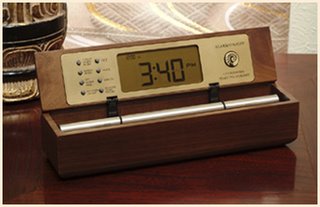 Digital Zen Alarm Clock, a meditation timer and progressive alarm clock Now & Zen’s Meditation Timer Shop
1638 Pearl Street
Boulder, CO 80302
(800) 779-6383
Posted in Bamboo Chime Clocks, intention, Meditation Timers, Meditation Tools, mindfulness practice, Now & Zen Alarm Clocks, Zen Timers
 Morning meditation Sense the Stillness in the Morning
For yoga instructor Alison Novie, mornings make an ideal time for meditation — perhaps more than any other time of day. “The sun’s about to rise, but it’s still sort of dark and quiet,” says Novie, who wakes at 5:00 a.m. to meditate. “I get up, brush my teeth, light a candle, and then sit for half an hour. The calm energy I get from that morning meditation carries me through the day.”
You don’t have to be a regular yoga or meditation practitioner to reap the benefits of a morning meditation ritual. Start with five minutes daily, using the guidelines that follow. Set you Meditation Timer from Now & Zen for 5 minutes. Then over the course of a few weeks — or when you are ready — gradually work up to 10 minutes. Remember, with meditation it’s quality, not quantity, that matters.
Start with awareness. Rather than lunge out of bed, Novie suggests waking up slowly. “Spend a few minutes just becoming conscious of the sensations of your body. Awareness is such a beautiful way of entering your day.” Once you’re up, resist the temptation to check your e-mail, flip on the radio, or do any of the other countless things that draw you out of yourself and into the concerns of the world. Instead, keep the focus inward.
Find a comfortable spot. Practice your five minutes of meditation anywhere you like (the bedroom floor, a favorite chair) except the bed, where you may fall back to sleep. To enhance the sacred aspect of her meditation space, Novie set up a small altar in her living room that she uses only for meditation, giving the space a positive energy of its own. Be sure to set your Meditation Timer from Now & Zen for 5 minutes.
Sense your breath. Close your eyes. Feel your breath moving in and out of your body without controlling it. Bring your attention to the rise and fall of your abdomen or to the tip of your nose. The more awareness you bring to breath and body, the more grounded in your body you’ll become. This, in turn, will help relieve some of the stress that comes with getting through your morning.
Don’t try to block your thoughts. Your mind will wander — that’s what it’s designed to do. Rather than try to fight off thoughts as they emerge, acknowledge them, but don’t engage them. And give yourself some slack — meditation is, after all, a practice, not perfection.
Our Zen Timepiece’s acoustic 6-inch brass bowl-gong clock is the world’s ultimate alarm clock, practice timer, and “mindfulness bell.”
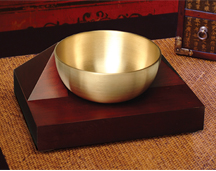 Meditation Gong Timer with Singing Bowl It fills your environment with beautifully complex tones whenever it strikes. In the morning, its exquisite sounds summon your consciousness into awakening with a series of subtle gongs that provide an elegant beginning to your day. Once you experience the Zen Timepiece’s progressive awakening, you’ll never want to wake up any other way. It also serves as the perfect meditation timer.
adapted from Body + Soul, March 2006

Now & Zen’s Clock Shop
1638 Pearl Street
Boulder, CO 80302
(800) 779-6383
Posted in Bamboo Chime Clocks, Chime Alarm Clocks, intention, Natural Awakening, Now & Zen Alarm Clocks, sleep, Sleep Habits
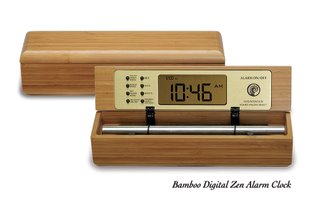 gentle awakening clock with acoustic chime Boulder, Colorado—an innovative company has taken one of life’s most unpleasant experiences (being startled awake by your alarm clock early Monday morning), and transformed it into something to actually look forward to. “The Zen Alarm Clock,” uses soothing acoustic chimes that awaken users gently and gradually, making waking up a real pleasure.
What makes this gentle awakening experience so exquisite is the sound of the natural acoustic chime, which has been tuned to produce the same tones as the tuning forks used by musical therapists. According to the product’s inventor, Steve McIntosh, “once you experience this way of being gradually awakened with beautiful acoustic tones, no other alarm clock will ever do.”
 sleeping woman using gentle awakening alarm clock Now & Zen – A Gradual
Alarm Clock Store
1638 Pearl Street
Boulder, CO 80302
(800) 779-6383
Posted in Bamboo Chime Clocks, Chime Alarm Clocks, Zen Alarm Clock
 Painting of Morpheus, Phantasos and Iris by baron Guérin - Morpheus God of Dreams & Sleep So much has been written about sleep, you’d think we’d all be wrapped in the arms of the slumber god Morpheus by now, dreaming sweet dreams and waking up refreshed. But for too many Americans a sound sleep remains, well, a dream. Instead they spend their nights tossing and turning and their days walking around bleary-eyed and exhausted.
You won’t sleep well if you don’t feel comfortable in your surroundings. This is why you should devote time to preparing the best possible sleep environment. Feng shui, the ancient Chinese art of placement and design, promotes bedrooms that are clutter-free and decorated with colors that engender feelings of serenity.
First, create a boundary around your bedroom, says feng shui expert Terah Kathryn Collins, author of The Western Guide to Feng Shui: Room by Room (Hay House, 1999). “The bedroom should be reserved for two things: sleep and romance,” she explains. Next, eliminate anything that increases activity or stimulates the mind such as TVs, computers and exercise equipment. “If you see your computer, you’ll think of emails you haven’t returned. Your treadmill will remind you that you need to work out more,” Collins says. If you must have a TV in the bedroom, place it in a cabinet with doors, so it can be out of sight when not in use. Hide any other must-haves behind an attractive, free-standing screen.
 Feng Shui, bed placement promotes relaxation Also, place your bed so you can see the door. “If the door is hidden from view, that increases anxiety,” Collins says. It also shouldn’t be directly in front of the door, but rather off to one side so that you don’t have the sense you can be easily intruded upon. The direction the bed points is also important. Collins says insomniacs should face the headboard west, which promotes relaxation and helps them to sleep past dawn. If your insomnia is depression-related, however, she suggests facing the headboard toward the east, which “speeds people up.” Sleeping with your head pointing north maintains overall balance, while south promotes intuition and dream recall.
 Ohara Koson (Shoson) 1877-1945 two carp and white lotus 1933 Colors can also affect your slumber. It’s best not to have gray, blue or pure white as the dominant color, Collins says, for the simple reason that “cool colors such as these don’t complement or ‘match’ your skin.” The problem? “Though they can be dramatic, they don’t make most people feel truly comfortable and relaxed.” Try this experiment: Find a pure white sheet and one in a skin-tone color such as beige, and hold them up to your face in front of a mirror. “Most people will notice that the skin-tone is more attractive against their skin, while the cool contrast of the white can make them look washed out and sallow,” Collins says. So choose pastel colors reminiscent of skin tones and/or the deep rich hues that come from skin tones, such as beige, chocolate brown, peach and terracotta.
Finally, make your bedroom a clutter-free zone. Remove piles of clothes and reduce that bedside stack of magazines and books to just one of each. “The more stimuli you can eliminate, the better,” she says. Collins adds that while mirrors can make rooms feel bigger and brighter, they also can be a distraction at night because reflections can be quite activating. Her suggestion: Place curtains over mirrored closet doors so they can be “closed” at night and opened during the day.
One of the ultimate Zen like experiences is waking-up from a great slumber refreshed and energized. Your mind and body are harmoniously one, both alert and focused. Having a refreshed mind and body are two keys to a natural and Zen lifestyle. Waking up in the morning should not be a loud and abrupt awakening, but rather it should be a peaceful positive experience. The right natural alarm clock can transition your deep and tranquil sleep into a serene start to consciousness. Imagine a long-resonating Tibetan bell-like chime waking you up to a beautiful morning experience.
The right alarm clock can be the most beneficial investment for you. With our Now & Zen natural alarm clock you are awakened more gradually and thus more naturally. Now & Zen is focused on creating a naturalistic lifestyle, and our clocks are an example of our philosophy.
adapted from Natural Solutions, December 2005 by Matthew Solan
 Zen Chime Alarm Clock, Digital Black Lacquer Chime Clock, clocks to make your bedroom a 'clutter-free' zone Now & Zen – The Gradual Chime Alarm Clock Store
1638 Pearl Street
Boulder, CO 80302
(800) 779-6383
Posted in Bamboo Chime Clocks, Chime Alarm Clocks, Japanese Inspired Zen Clocks, Natural Awakening, Now & Zen Alarm Clocks, Progressive Awakening, Sleep Habits
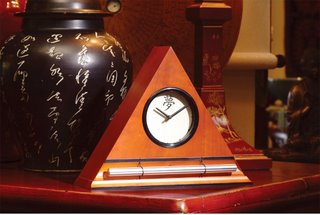 Change Your Alarm Clock - Choose the Gentle Chime Clock from Now & Zen Gradual awakening with natural tones helps reduce morning grogginess
Rather than an artificial recorded sound played through a speaker, the Zen Clock features an alloy chime bar similar to a wind chime. When the clock’s alarm is triggered, its chime produces a long-resonating, beautiful acoustic tone reminiscent of a temple gong. Then, as the ring tone gradually fades away, the clock remains silent until it automatically strikes again three minutes later. The frequency of the chime strikes gradually increase over ten-minutes, eventually striking every five seconds, so they are guaranteed to wake up even the heaviest sleeper. This gentle, ten-minute “progressive awakening” leaves users feeling less groggy, and even helps with dream recall.
 change your alarm clock, change your life Now & Zen – The Gradual Alarm
Clock Store
1638 Pearl Street
Boulder, CO 80302
(800) 779-6383
Posted in Bamboo Chime Clocks
« Previous Page — « Previous Entries
Next Entries » — Next Page »
|
|
|
|